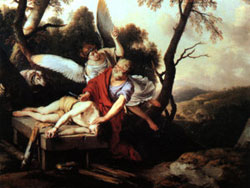
Feastday: February 14
Death: 422
Hermit, bishop, and missionary who was born in Cyrrhus, Syria. He became a recluse in the desert near Mount Lebanon and tried to convert the local people. Reviled for his efforts, Abraham continued his apostolate, eventually winning over his neighbors to the faith. Unable to pay their taxes, the locals were saved by Abraham, who used his own funds to settle their debts. He was named the bishop of Carrhae, in Mesopotamia, where he again converted the local people. While visiting Emperor Theodosius II in Constantinople, now Istanbul, Turkey, Abraham died.
For other uses, see Abram (disambiguation).Saint Abraham (Cyrrhus, Syria, c. 350–Constantinople, 422) (also known as Abraames, Abraham of Charres and Abraham the Apostle of Lebanon was a Syrian hermit and bishop of Harran.
Life
Abraham was born and educated at Carrhae (modern Harran) in Syria, and preached the Gospel in the valley of Mount Lebanon, where he lived as a hermit. His life was described by Theodoret of Cyr (393-466 A.D.), the Bishop of Cyrrhus, who named him among the other thirty holy men and women in his book "Historia Religiosa" (Religious History).
He spent the first part of his life in the desert of Chalcis where he lived an ascetic life, he tried his body by fasting and still standing and was so exhausted that could not move. But then he left for Lebanon as a merchant and helped the inhabitants of the village where he stayed to pay the taxes with the help of his friends. The name of the village is not known but it is believed to be Aqura- Afka. "It was probably located in Aqura near the river Adonis." He was asked by the villagers to become their tutor and he accepted providing they would build the Christian church. He stayed in this village for three years as a priest and then returned to his ascetic life as a hermit.
He was later elected bishop of Harran in Mesopotamia (Carrhae), where he worked vigorously to reduce the existing abuses. He died in Constantinople in 422 after going there to consult with Theodosius II, although some argue that it may have instead occurred in 390 under Theodosius II's predecessor, Theodosius I. His body was transferred back to Harran, to the city of Antioch where he was buried. His feast day is 14 February.
According to Alban Butler,
He was a holy solitary, who, going to preach to an idolatrous village on Mount Libanus, overcame the persecutions of the heathens by meekness and patience. When he had narrowly escaped death from their hands, he borrowed money, wherewith to satisfy the demands of the collectors of the public taxes, for their failure in which respect they were to be cast into prison; and by this charity he gained them all to Christ. After instructing them for three years, he left them in the care of a holy priest, and returned to his desert.
He was some time after ordained bishop of Carres, in Mesopotamia, which country he cleared of idolatry, dissensions, and other vices. He joined the recollection and penance of a monk with the labours of his functions, and died at Constantinople, in 422, having been sent for to court by Theodosius the Younger, and there treated with the greatest honour on account of his sanctity. That emperor kept one of his mean garments, and wore it himself on certain days, out of respect.





